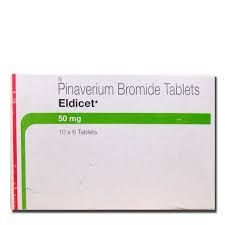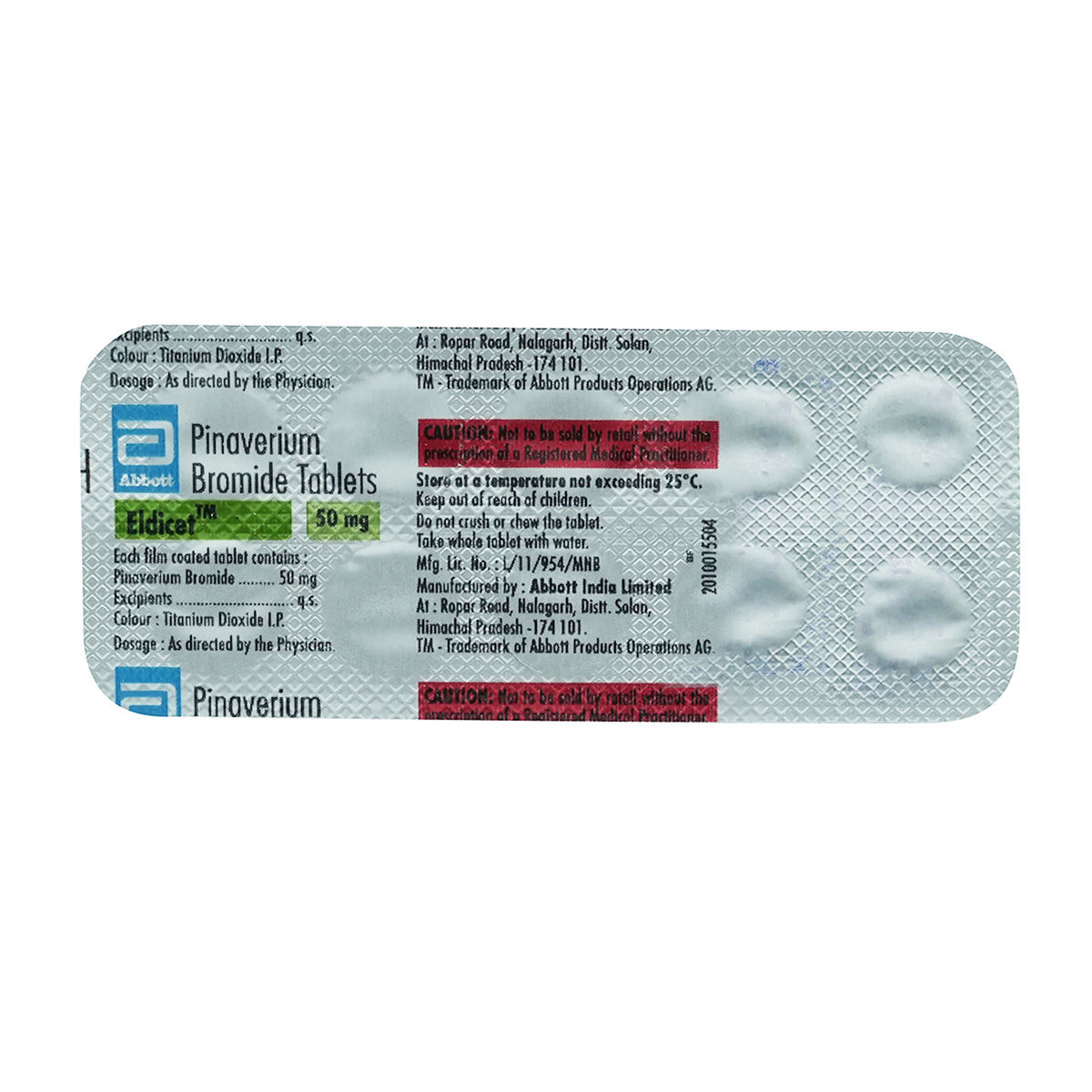Pinaverium Bromide
About Pinaverium Bromide
Pinaverium Bromide belongs to the class of medications called antispasmodic agents primarily used to treat irritable bowel syndrome. Irritable bowel syndrome is a common disease that affects the large intestine and causes abdominal pain, cramps, and other symptoms. The exact cause of the disease is not known. Symptoms include bloating, abdominal pain, constipation, and diarrhoea.
Pinaverium Bromide contains Pinaverium bromide. It works by relaxing the gut (intestine) and stomach muscles. It breaks sudden muscle contractions (spasms), thus reducing cramps, bloating, pain and discomfort. It dilates the smooth muscles present in the stomach, intestine, and cervix, thus reducing spasms.
Take Pinaverium Bromide as prescribed by your doctor. You are advised to take Pinaverium Bromide for as long as your doctor has prescribed it for you, depending on your medical conditions. You may experience nausea, headache, constipation, abdominal pain, and heartburn. Most of these side effects of Pinaverium Bromide do not require medical attention and gradually resolve over time. However, if the side effects are persistent, reach out to your doctor.
Do not use Pinaverium Bromide without doctor advice if you had a skin reaction or irritation to any medicine. Inform your doctor before taking Pinaverium Bromide if you have a hernia. Consult your doctor before using Pinaverium Bromide if you are pregnant or breastfeeding. Pinaverium Bromide may cause drowsiness, so drive only if you are alert after taking Pinaverium Bromide. Keep your doctor informed about your health condition and all the medicines you take to rule out any side effects.
Uses of Pinaverium Bromide
Medicinal Benefits
Pinaverium Bromide is used to treat symptoms of irritable bowel syndrome, including irregular bowels (e.g., constipation or diarrhoea), stomach pain, and bloating. It is also used for symptoms associated with other intestinal diseases (involving the bile duct and gallbladder). It breaks sudden muscle contractions (spasms), thus reducing cramps, bloating, pain and discomfort. It dilates the smooth muscles present in the stomach, intestine, and cervix, thus reducing spasms.
Directions for Use
Storage
Side Effects of Pinaverium Bromide
- Nausea
- Headache
- Dry mouth
- Constipation
- Abdominal pain
- Heartburn
Drug Warnings
Please do not take Pinaverium Bromide if you are allergic to any of its ingredients. Before taking Pinaverium Bromide, inform your doctor if you have galactose intolerance, Lapp lactase deficiency or glucose-galactose malabsorption. Inform your doctor before taking Pinaverium Bromide if you have a hernia. Consult your doctor if you are pregnant or breastfeeding. Pinaverium Bromide may cause drowsiness and dizziness, so drive only if you are alert. Pinaverium Bromide should not be given to children as safety and effectiveness have not been established. Avoid consuming alcohol with Pinaverium Bromide as it could lead to increased dizziness. Keep your doctor informed about your health condition and medicines to rule out any side effects.
Drug Interactions
Drug-Drug Interactions: Pinaverium Bromide may interact with other anticholinergic/ antispasmodic medicines (e.g. hyoscine butyl bromide, ipratropium bromide, tiotropium bromide)
Drug-Food Interactions: No food interactions were found or established.
Drug-Disease Interactions: Inform your doctor if you suffer from a hernia, galactose intolerance, Lapp lactase deficiency or glucose-galactose malabsorption.
Drug-Drug Interactions Checker List:
Safety Advice

Alcohol
cautionConsuming alcohol with Pinaverium Bromide is not advisable as it may cause unpleasant side effects like increased drowsiness.

Pregnancy
cautionIt is advisable to inform your doctor if you are pregnant or likely to get pregnant before taking Pinaverium Bromide.

Breast Feeding
cautionIt is not known if Pinaverium Bromide may pass into breast milk or not. Thus Pinaverium Bromide should be used in breastfeeding mothers only if prescribed by the doctor.

Driving
cautionPinaverium Bromide may cause drowsiness so drive only if you are alert.

Liver
cautionPinaverium Bromide to be taken with caution, especially if you have a history of liver diseases/conditions. The dose may have to be adjusted by your doctor.

Kidney
cautionPinaverium Bromide to be taken with caution, especially if you have a history of Kidney diseases/conditions. The dose may have to be adjusted by your doctor.

Children
unsafePinaverium Bromide should not be used by children as the efficacy and safety have not been established.
Habit Forming
Diet & Lifestyle Advise
- Eat smaller meals more often.
- Avoid smoking and alcohol consumption. Alcohol intake leads to increased production of stomach acid, thereby increasing acidity and heartburn.
- Maintain a healthy weight by regular exercising.
- Avoid carbonated and caffeinated beverages.
- Practise relaxation techniques and avoid stress by doing yoga or meditation.
- Avoid foods such as high-fat food, spicy food, chocolates, citrus fruits, pineapple, tomato, onion, garlic, tea and soda.
- Avoid deep-fried and spicy foods.
- Foods containing probiotics may help in providing relief from gas and bloating.
Special Advise
Do not take Pinaverium Bromide while lying down or just before bedtime.
Patients Concern
Disease/Condition Glossary
Irritable bowel syndrome: It is a common disease that affects the large intestine and causes abdominal pain, cramps, and other symptoms. It may lead to repeated pain in the stomach and changes in bowel movements. The exact cause of the disease is not known. Symptoms include bloating, abdominal pain, constipation, and diarrhoea.
FAQs
Pinaverium Bromide belongs to the class of medications called antispasmodic agents primarily used to treat irritable bowel syndrome.
Pinaverium Bromide works by relaxing the muscles in your stomach and gut (intestine). It relieves cramps, bloating, pain, and discomfort by reducing abrupt muscle contractions (spasms). It relaxes the smooth muscles of the stomach, colon, and cervix, reducing spasms.
Yes, the use of Pinaverium Bromide can result in dry mouth. If you experience a dry mouth, drink plenty of water. Take regular sips during the day and keep some water by your bed at night.
Store it according to the directions mentioned on the label or pack. Dispose of the unused medicine. Make sure it is not consumed by children, pets, and other people.
The common symptoms of the disease involve abdominal pain, constipation, diarrhoea, gas, loose and watery stool, urgent need to have a bowel movement, and a hard time passing the stools. People with this disease may have a poor diet.
It is advised to avoid food that stimulates the intestine and cause diarrhoea. It includes alcohol, coffee, and other products that contain caffeine, dairy products like milk, cheese, and ice cream. You may also avoid chocolate, nuts, and foods with high sugar.







